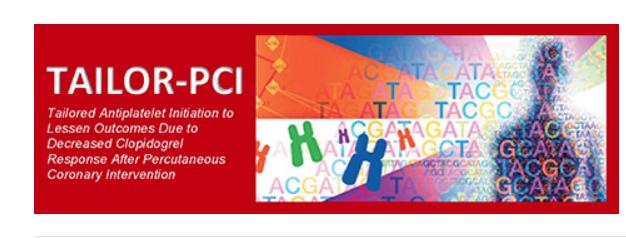
September 2, 2020 — An international, first-of-its-kind cardiology trial used personalized genetic testing to reduce by 34 per cent the number of serious adverse events following balloon angioplasty, a treatment for the most common form of heart disease.
For patients undergoing percutaneous coronary intervention (PCI), the choice of antiplatelet therapy can be critical to post treatment success, and to minimize the chance of heart attack or stroke.
The TAILOR-PCI trial, co-led by principal investigators Michael Farkouh, M.D., cardiologist and Multinational Clinical Trials Chair at the Peter Munk Cardiac Centre and director of the Heart and Stroke/Richard Lewar Centre of Excellence in Cardiovascular Research, University of Toronto, and Naveen Pereira, M.D., professor of medicine and cardiologist at Mayo Clinic, studied the effectiveness of genetic-guided therapy in patients that have had PCIs when compared to conventional therapy.
“The trial introduces the concept and validates the approach to personalized medicine when it comes to antiplatelet therapy, and therefore allows our physicians to potentially change their practice based on the needs of patients undergoing PCI,” Farkouh said. “This will potentially inform the kinds of therapies patients with heart disease are prescribed after PCI world-wide.”
Placement of a balloon and metal stent inside a heart artery can irritate the blood vessel and cause it to clot, which can block the artery from being treated. PCI patients are prescribed medications to prevent their blood from clotting – the most common medication used is clopidogrel, which stops blood platelets from sticking together and prevents clots from forming. However, in almost a third of all patients, the gene (CYP2C19) required to activate clopidogrel does not work.
As a result, patients with this genetic variant may be at a higher risk of experiencing adverse cardiovascular events, such as heart attack or stroke in the year following their procedure.
Current guidelines do not recommend genetic testing when prescribing clopidogrel, and the trial was designed to determine if genetic testing would decrease cardiovascular complications after PCI.
The Journal of the American Medical Association (JAMA) published the results of the TAILOR-PCI trial on Aug. 25, 2020.[1] The trial enrolled 5,302 patients treated for heart artery blockage with one or more stents, and followed them for one year.
Half the group was tested for the CYP2C19 gene variation, and carriers (35%) were treated with the alternative anti-platelet medication, Ticagrelor. The remainder of the group was given Clopidogrel, as was the entire control group of patients who did not receive genetic testing before PCI.
Although the TAILOR-PCI trial did not meet its primary endpoint of demonstrating a 50 per cent reduction at one-year post-procedure, trends did show a benefit towards genetic testing with a 34 per cent reduction in serious adverse cardiovascular events.
“Although these results fell short of the effect size that we predicted, they nevertheless provide a signal that offers support for the benefit of genetically guided therapy, with approximately one third fewer adverse events in the patients who received genetically guided treatment compared with those who did not,” Pereira said.
A post-hoc analysis of the trial also showed a nearly 80% reduction in the rate of adverse events in the first three months of treatment among patients who received genetically guided therapy compared with those who did not.
Since the study’s design in 2012, the standard of care following PCIs has greatly improved. Drug-coated stents and other treatments have reduced the rate of adverse events for patients in a year, but at the same time made it more difficult for the trial to reach its goal.
The trial is currently undergoing an extended follow-up beyond the original 12-month period.
The study was funded by Mayo Clinic, Mayo Clinic Center for Individualized Medicine and the National Heart, Lung and Blood Institute. Spartan Bioscience Inc. supplied the point-of-care genetic tests used.
Find more news on antiplatelet therapies
Reference:


 November 14, 2025
November 14, 2025 









